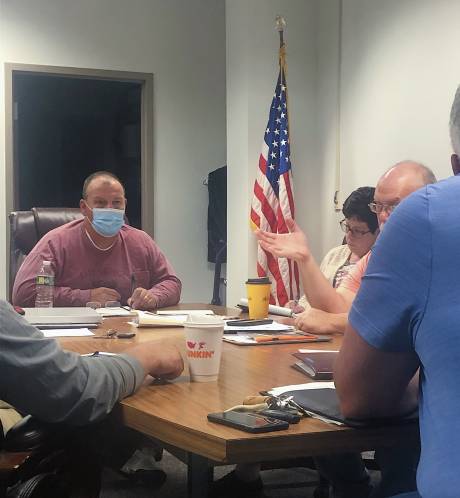Posted by Andrew Erbell on June 10, 2009 - 9:19am
But, I'm fear-mongering, right? You do know all these czars the President has been appointed are accountable to no-one except the President, right? I thought our country was founded with a system of checks and balances in government?
President Obama is not the first to name a superaide to an extraordinarily powerful position accountable only to him. Richard Nixon may have begun the practice, with an "energy czar," and President Bush named Tom Ridge the White House czar of homeland security before the Cabinet-level Department of Homeland Security was created.
The people and most of the media are complicit. People beg the president to solve all their problems, as if he was some combination of a shaman, doctor, teacher, commander, worker of magic and all-powerful cult leader, and instead of protesting such veneration we go along with it.
Speaking of Czars....
President Bush Approves 'Copyright Czar' Bill
10.13.08
by Chloe Albanesius
President Bush on Monday approved a controversial bill that will effectively create a "copyright czar" within the White House.
Bush signed the Prioritizing Resources and Organization for Intellectual Property (PRO-IP) Act, a measure that will create several new government enforcement positions.
The Senate approved the bill on Sept. 30 after Sen. Ron Wyden successfully requested that Congress remove a provision requiring the Department of Justice to enforce copyright provisions.
The DOJ told a House Judiciary subcommittee in December that the PRO-IP Act was unnecessary and counterproductive to the work it has already accomplished.
The bill does, however, create an Intellectual Property Enforcement Coordinator (IPEC) who will serve within the Office of the President. The IPEC will chair a committee made up of representatives from the Office of Management and Budget, the DOJ, the U.S. Trade Representative, the Patent and Trademark Office, the Department of Homeland Security, the FDA, and others.
www.pcmag.com/article2/0,2817,2332432,00.asp
President Bush's Drug Czar Invades Politics
Posted July 18, 2007 | 04:44 PM (EST)
In a startling discovery of what appears to reek of the stench of collusion, a Congressional committee has discovered evidence that the nation's drug czar and his deputies traveled to almost two dozen events with vulnerable Republican members of Congress in the months prior to the 2006 elections. Rep. Henry Waxman, D-California, Chair of the U.S. House Committee on Oversight and Government Reform, alleged that the taxpayer-financed trips were orchestrated by President Bush's political advisers and often combined with the announcement of federal grants or actions that benefited the districts of the Republican members.
The president continues to blatantly compromise the integrity of his administration for political gain, legality and ethics be damned. Two questions should be asked. How long will the drug czar and other public servants continue to use taxpayer money to influence voters on behalf of the Republican party before Congress takes action to stop this clearly unethical and illegal action? President Bush: how long will you fund costly, ineffective and harmful policies as a quid pro quo to secure a few votes?
http://www.huffingtonpost.com/bill-piper-and-anthony-papa/president-bushs-drug-cza_b_56811.html?view=print
Bush Finds A War Czar
President Taps 3-Star General To Oversee Military Operations In Iraq And Afghanistan
NEW YORK, May 16, 2007 | by Joel Roberts
President Bush has finally found a war czar. Army Lt. Gen. Douglas E. Lute will coordinate U.S. military operations in Afghanistan and Iraq. At least five retired four-star generals turned down the new position before Lute -- a three-star general -- came on board, according to the
Washington Post. The newspaper described Lute as an important behind-the-scenes foe of Mr. Bush's troop buildup in Iraq.
But Mr. Bush's national security adviser, Stephen Hadley, told the New York Times that Lute now supports the president's "surge" strategy. Lute's new role must be confirmed by the Senate.
http://www.cbsnews.com/stories/2007/05/16/the_skinny/main2811860.shtml
Bush Names Negroponte Intel Czar
Intelligence Director Will Oversee 15 Agencies, Including CIA
WASHINGTON, Feb. 17, 2005 | by John Esterbrook
CBS/AP) President Bush named John Negroponte, the U.S. ambassador to Iraq, as the government's first national intelligence director Thursday, turning to a veteran diplomat to revive a spy community besieged by criticism after the Sept. 11 attacks.
Ending a nine-week search, Mr. Bush chose Negroponte, who has been in Iraq for less than a year, for the difficult job of implementing the most sweeping intelligence overhaul in 50 years.
Negroponte, 65, is tasked with bringing together 15 highly competitive spy agencies and learning to work with the combative Defense Secretary Donald H. Rumsfeld, the brand new CIA Director Porter Goss and other intelligence leaders. He'll oversee a covert intelligence budget estimated at $40 billion.
http://www.cbsnews.com/stories/2005/02/17/terror/main674678.shtml

